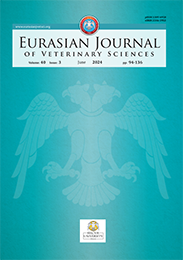| 2012, Cilt 28, Sayı 1, Sayfa(lar) 021-026 |
| [ Türkçe Özet ] [ PDF ] [ Benzer Makaleler ] |
| Acute phase response and clinical changes in calves with lipopolysaccharide induced endotoxemia |
| Alparslan Coskun1, lsmail Sen2 |
| 1Department of Internal Medicine, Faculty of Veterinary, Medicine, Cumhuriyet University, Sivas 2Department of Internal Medicine, Faculty of Veterinary Medicine, Selcuk University, Konya, Turkey |
| Keywords: Acute phase proteins, endotoxemia, calves, clinical score |
| Downloaded:1815 - Viewed: 3426 |
|
Aim: The purpose of the study was to determine the levels
of acute phase proteins and clinical changes in calves with
lipopolysaccharide induced experimental endotoxemia.
Materials and Methods: Eight Holstein breed calves were used in the study. Endotoxemia was induced via intravenous administration of 0.1 μg/kg dose of lipopolysaccharide in 50 mL of physiological 0.9% NaCl over 30 min. The calves were continuously observed for clinical changes during the experiment, and serum acute phase protein levels were measured. Results: Increase in respiratory frequency, tachycardi, mucosal hyperemia/cyanosis, recumbency, depression, hyperthermia/hypothermia, and poor suckle reflexes were observed in all calves after lipopolysaccharide administration. After lipopolysaccharide infusion, serum haptoglobin (500±93.2 μg/mL) and serum amyloid A (185±46.6) concentrations reached peak levels of at 36 h and 24 h, respectively. Conclusion: Changes in acute phase proteins and clinical findings were related to endotoxemia. A moderate to high increase in haptoglobin and serum amyloid A concentrations may indicate the presence of endotoxemia in calves. |
| [ Türkçe Özet ] [ PDF ] [ Benzer Makaleler ] |





